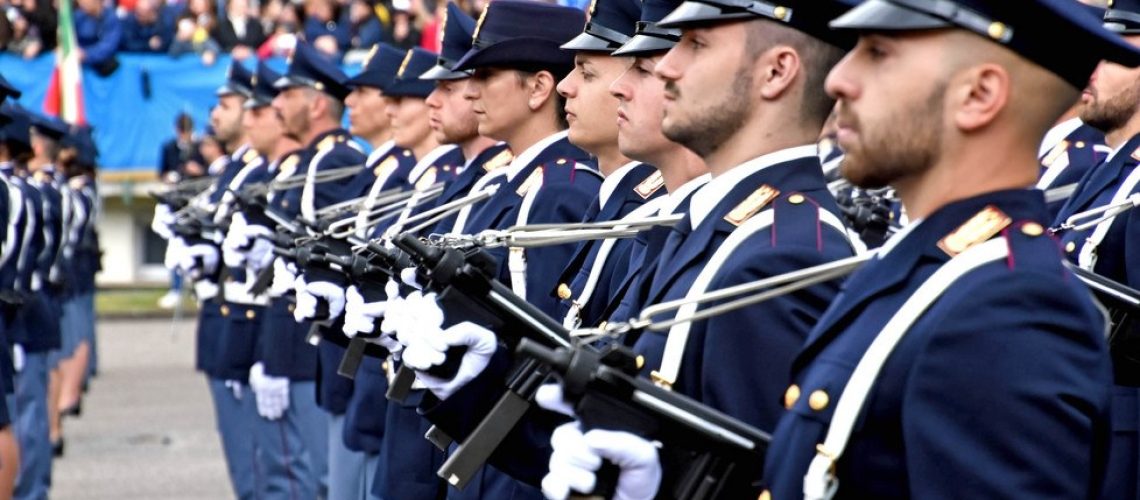Ah, school… as a famous Italian singer in the opening theme of the ’90s animated series “Police Academy” once sang, “because school is always school.”
It’s easy to make references to the eponymous 1980s film, a colossal in its own right, a comedy that I recommend everyone to watch at least once in their life. In some ways, this movie vividly and stereotypically portrays a harsh reality that was already present in those years: a stark discrepancy between the academy and the streets.

In this article, I don’t want to argue for or against instructors or training programs; what interests me is analyzing an aspect that is often overlooked or greatly underestimated.
School shapes while reality transforms a young cadet, and the real question we should all ask ourselves is whether this training truly prepares them for the transformation from a civilian to a police officer. In some ways, police academies around the world have a similar structure, although there are differences in the duration of attendance and the administration’s structure itself.
A cadet, arriving on the first day of their new life, has already successfully passed all the admission tests to that academy, tests that vary greatly from nation to nation in intensity and characteristics. In some ways, the new cadet is, or should be, the best candidate that department or administration could choose.
The first day, therefore, is a starting point for everyone, both for the cadet and for the school, which in the following months can decide whether that choice was correct or not. And it is precisely here that the issue we are discussing arises, of that decision and how that cadet will be prepared to face the life of a “cop.”
Are we sure that the world awaiting them will not be a grinder for them and for everything they have learned during the training course? Unfortunately, I have to say it, but no, they won’t be ready, and not for the reasons one might think.

Inside the Police Academy: A Closer Look
We’ve already made a brief reference to the film “Police Academy,” so I won’t draw any further parallels, although I’m a big fan of 80s/90s cinema, so I’ll make this effort. Returning to much more serious topics, let’s try to analyze the academic environment of the police (I’m referring to police in a generic sense, so we also include other law enforcement bodies such as sheriffs, carabinieri, the Guardia Civil, etc.). The academic environment is extremely structured and organized, militarily arranged with highly regimented schedules. I refer to an interesting article that briefly summarizes the system of a US academy: What to expect from police academy training.
If we observe a police school from the inside, we can immediately understand how cadets, from the very first day, will live their existence for a set period of time. Military organization, stress, structured time, study, motivation from the instructors, and an environment created specifically for new recruits – a peer environment among the recruits (they’re all cadets) with a detachment from the instructors, who, barring exceptional cases, will always speak positively about the Department or the Organization or the Administration.
From day one, cadets are subjected to psychological pressure from the instructors, as well as significant physical training, weapon use, police defense, technical-operational procedures, simulation of interventions, and, of course, the study of laws and regulations as basic procedures of police work. There’s an emphasis on cadets’ awareness of the challenges they will face. In the coming months, cadets should be trained to be fully aware of what they will face day after day, with the hope that what they have learned will perfectly match the experiences they will accumulate in their careers.
Personally, I believe that the various police schools, with some exceptions in certain countries or organizations, are all capable of making cadets perceive and become aware of what awaits them… at least theoretically. Let’s start from a premise more akin to Tony Robbins than to a police academy: “If you want to achieve different results, you must become a different person.” In fact, someone who wants to wear the uniform and dedicate themselves to serving the community must acquire a different mentality, a different way of seeing and approaching the world entirely.
The reading of this article on the “warrior” mentality by Lt. Col. Dave Grossman is interesting: Sheepdog Mentality. But is this enough? Is it sufficient to face a long career in law enforcement?

Stress and Routine in the Daily Life of Police Officers
In my native language, one might say, “and here’s where the donkey falls,” as if to suggest that this is precisely the Achilles’ heel. Does the academy prepare the cadet? The answer, barring specific cases, is an absolute yes; however, it prepares them for an ideal world that, unfortunately, will be far from the reality they’ll encounter “out there.” Perhaps each of you is thinking of specific police operations, the use of firearms, pursuits, and scuffles. Wrong train of thought! What I’m referring to is a much more insidious danger: the internal environment.
Psychological Aspects of Stress and Routine in the Police Work Environment
Understanding stress and routine in the police workplace requires delving into the psychological aspects that affect officers’ mental health and performance. Stress in law enforcement is multifaceted, stemming from various sources such as exposure to violence, shift work, administrative pressures, and the responsibility of making life-or-death decisions. Research by scholars like Kirschman and Kamena highlights the prevalence of stress-related disorders among police officers, including PTSD, anxiety, and depression. Moreover, the routine nature of police work, characterized by repetitive tasks and mundane responsibilities, can contribute to feelings of monotony and disillusionment.
How Daily Reality Can Differ Significantly from Academy Simulations and Training
While police academies aim to simulate real-world scenarios, the actual experiences officers face on the job often diverge from these simulations. In the academy, cadets undergo controlled exercises that may not fully capture the unpredictability and complexity of policing in the field. Research by Anderson and colleagues emphasizes the need for adaptive training methods that replicate the dynamic nature of police work. Officers must navigate ambiguous situations, interact with diverse communities, and manage interpersonal conflicts, challenges that are not always adequately addressed in training programs. Furthermore, the gap between academy training and real-world experiences can lead to a steep learning curve for new recruits, impacting their confidence and decision-making abilities on the job.
Does it end here? No, this is just the tip of the iceberg. I’ve chosen to delve into the external world they’ll encounter, and now comes the highlight.

Toxic People
The first aspect for which cadets are generally not prepared is the toxic and demotivating environments.
A toxic and demotivating environment, created by toxic and demotivating people, is the worst cancer for any department or system. If that demotivation comes from the top management, then the situation becomes dire. Each of us who serves or has served in law enforcement knows perfectly well that this aspect is fundamental for well-being, career, training, and safety.
Every department and every officer on duty has their own vision of policing, compensation, retirement, and career. Unfortunately, many of them have a rather pessimistic and demotivating outlook. Is it their fault? Absolutely not. We’re not here to point fingers at anyone (remembering always that if we point a finger at someone, we have four fingers pointing back at us). Nevertheless, we all must take responsibility for the fact that “Yes, it is like this.” None of us has been prepared to face this enemy: toxicity.
When we arrive at work feeling tired, unmotivated to start our shift, with colleagues constantly talking about pay, overtime, and retirement, maybe with wrinkled uniforms, criticizing everything and everyone, and even making fun of those who keep their uniform tidy, stay in shape, constantly train with both internal and external courses, read, study, and speak well of the police, we are faced with a very complicated situation.
The cadet, no matter how correctly selected and trained, will then be “transformed” in the environment where they will start their service. If the transformation occurs in such an environment, unfortunately, the cadet will reproduce that pattern they have learned.
They will soon start to think that, all in all, that extra glazed donut isn’t so bad, and that exercising every day is just additional stress in the life of a police officer.
They will begin to think that the mission for which they joined the administration is, after all, just a bedtime story, and that it’s good to focus on their own bank account, their wallet, and eagerly await retirement. They will start to think that, in fact, attending hundreds of training courses is a waste of time, and that they already have the necessary training to handle various situations, believing that instructors at these courses are just fantasizing. In Italy, they are called “i camosci,” in Spain, they are called “los caymanes.”
Regardless of what they are called, these individuals can single-handedly ruin the entire atmosphere of a department and, consequently, the new cadets who, with so much energy, begin their service.

Are there solutions?
Fortunately, all is not lost for us.
There is a solution to everything, but first, we must acknowledge the difficulty.
Once we’ve done this with a good “shameless awareness bath,” we’re already taking the first step towards a solution.
Firstly, every training institute should incorporate hours and hours of training to understand, manage, and assist toxic people and environments. In this regard, the go-to reference book is Lillian Glass’s “Toxic People.”
Every cadet must be fully aware of what they will encounter and, I apologize for the word, the “crap” they will also encounter within the Administration. Motivation alone is not enough! The extraordinary work of instructors in motivating new cadets is useless without proper preparation on this topic. Now, one might ask, “But what about those who are no longer cadets?”
Very simple, every department should include this topic and treat it with as much importance as “first aid” or the tactical use of firearms.
Toxic environments, remember, don’t directly kill any police officer, but they are the number one indirect cause of deaths, suicides, and workplace accidents.



2 Commenti
I’m nno longer certtain where you arre getting your info, however
good topic. I needs to spend some time finding out more or working out more.
Thanks for excellent info I used to be in search of this information for my mission. https://lvivforum.pp.ua/